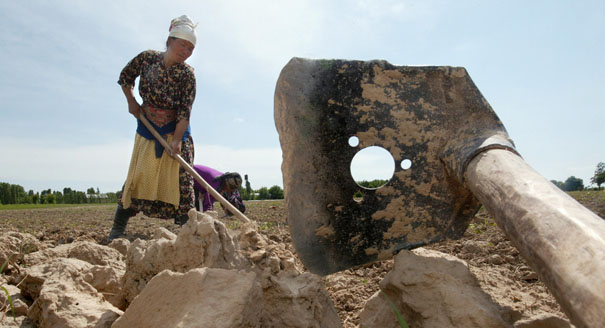Uzbeks have been working abroad for years without their country caring. Most seem in no hurry to go home, despite the depreciation of the ruble and the economic crisis in Russia, their most popular destination. Recently, however, Uzbekistan’s president, Islam Karimov, decided he wants them to come home. The issue of Uzbek migrant workers was one of the topics of discussion during his two-day visit to Russia on April 25–26.
This appeal reflects the authorities’ broader concerns about what Uzbeks are doing abroad. More than 500 are fighting for the so-called Islamic State. Even so, Uzbekistan’s campaign to bring migrant workers home is mostly rhetoric. A country of 31.5 million has gotten used to living without millions of its citizens, who also send remittances home. The last thing the economy needs is for them to come rushing back.
Uzbekistan, along with neighboring Tajikistan, is the main supplier of cheap labor in the former Soviet Union. Traditionally considered one of the least migratory peoples in Central Asia, millions of Uzbeks are now working abroad, the result of a rapidly growing population, an outdated economy, migration to cities, and mounting unemployment. Every ninth Uzbek citizen is a migrant worker, according to a conservative estimate.
Most migrants go to Russia. In 2013, every fourth migrant worker there had come from Uzbekistan—2.3 million, according to Russia’s Federal Migration Service. The actual number may be twice as high. Besides Russia, another half a million Uzbeks work in Kazakhstan, Turkey, South Korea, the United Arab Emirates, or further afield.
Until recently, the Uzbek authorities were not worried. Migrant workers do not need unemployment benefits and send home several billion dollars a year in remittances. In the record year of 2012, Uzbeks sent back $6 billion in bank transfers alone from Russia, according to the Bank of Russia, or 12 percent of Uzbekistan’s GDP. The total amount of money sent home is much bigger.
Attitudes on the migration issue have changed over the past few years, starting at the grassroots level. Uzbekistan’s Agency for External Labor Migration sent all local visa and registration authorities warning signs outlining what labor migrants can expect to find abroad, from prostitution to slavery or recruitment into extremist organizations. Meanwhile, society began to frown on “turncoats” working for another country’s benefit rather than Uzbekistan’s.
A turning point came in early 2013, when an Uzbek street cleaner was murdered in Moscow. He was not the first, but Karimov was suddenly interested. “Why did he go there?” he asked indignantly. “Couldn’t this man earn as much money at home as he did as a street cleaner in Moscow? It really is a shame for the nation if our people can only work as street cleaners.” This was the first time the Uzbek president had spoken so severely in public about migrant workers.
A few months later, Karimov said it was “disgusting” that Uzbeks were working as street cleaners in Moscow and compared them to loafers and beggars. Many people took these words as those of a man out of touch with reality: before the ruble fell, cleaning streets in Moscow could bring in $500, two or three times the average monthly salary in Uzbekistan. The speech was kept out of the state media, but was picked up online. “Our Daddy is out of his mind,” wrote Uzbek bloggers, likening him to Brezhnev.
The Uzbek state’s attitude toward migrant workers then began to change, with other officials echoing the president’s views. The authorities united with the police and Mahallah committees, which many see as the backbone of the regime, and launched a campaign to get migrants to come home. In Kokand, a city in eastern Uzbekistan, they set up agitprop groups of local officials, Mahallah activists, teachers, and imams, who visited migrants’ families and spoke of the duty to work for Uzbekistan. The security services obtained migrants’ phone numbers to call them and persuade them to return. Some who refused were threatened and told they would be extradited and imprisoned when they got home. Mid-level officials interpreted the concern at the top as a signal to clamp down on migrant workers, while lower-ranking ones took this as license to blackmail and intimidate migrants and their relatives.
The campaign’s effectiveness is hard to judge. As the ruble fell and the economy slowed, labor migrants were leaving Russia anyway. Just 1.8 million Uzbeks were working there at the start of 2016, according to Russia’s Federal Migration Service. The number of Uzbeks and the level of money transfers fell faster than for workers from other countries in Central Asia. Still, a similar number of Uzbek migrants went home during the crisis of 2008–2009, when there was no campaign. In any case, the campaign was mostly declarative. Interstate agreements encouraging Uzbeks to go home would have shown that top officials were serious about them returning.
Economically, this makes sense. Uzbekistan’s economy could not cope with the return of hundreds of thousands of jobless Uzbeks. The country’s population has almost doubled since the early 1990s, and the birth rate remains one of the highest in the former Soviet Union. The official unemployment rate of 5.1 percent in 2015 is deceptive. Independent experts say it could be 20 percent in cities and twice as high in rural areas. The Uzbek economy is growing, but the current authorities have failed to solve economic problems and the country remains dependent on the Russian market.
That means the status quo suits everybody. Neither the authorities in Uzbekistan nor the host countries want the mass return of Uzbeks from abroad, regardless of what the Uzbek president and other officials are saying. The job market back home means that Uzbek migrants are not rushing to come home, either.
